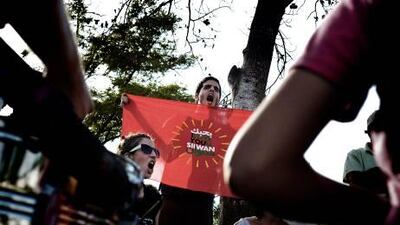TEL AVIV // Israel called on the Palestinians yesterday not to walk out of the nascent Middle East peace talks over the impending expiry of a partial settlement freeze, suggesting that it would place restrictions on renewed building.
Israeli government officials were reported by domestic and international media as saying that Benjamin Netanyahu, the prime minister, has intensified his contacts in recent days with leaders in Washington and other countries to find a compromise on the settlements. "If this is going to work, it must be a two-way street," one Israeli official, who declined to be named because the matter was still under negotiation, was quoted by the Reuters news agency as saying. "It also has to be said that the plan for building in the West Bank in the coming year is so modest that in no way would it impact on the parameters for a peace deal." The Palestinian president Mahmoud Abbas, however, yesterday rejected any compromise that does not guarantee a "complete halt" to settlement construction, his advisor Nabil Abu Runeina told AFP.
"A total freeze must be maintained on settlement activity in the Palestinian territories, including in Jerusalem. We reject any partial solution," Mr Abu Runeina said. Israel's partial 10-month moratorium on construction in Jewish settlements in the West Bank is scheduled to end tomorrow and the Palestinian leadership has threatened to abandon the negotiations should it not be extended. Mr Netanyahu has so far rejected proposals by the US and Egypt to continue the freeze for another three months.
A statement from Mr Netanyahu's office suggested the Palestinians should back down from their demand on the settlements for the good of the peace process. It quoted the premier as saying that settlement construction had not hindered peace negotiations in the past 17 years. "If the Palestinians want peace, they will stay in the talks with us, in order to reach a framework agreement within a year," the statement said. "I hope the Palestinians will not leave the talks and will not turn their back on peace."
But even as pressure mounts on Israel and the Palestinians to resolve the dispute, questions have emerged on how effective the moratorium has actually been. Comments over the past few days by peace activists monitoring construction activity indicated that settlement expansion has not significantly dropped in the past 10 months, likely because the freeze only limited new projects while allowing those already under way to be completed.
Government figures cited by the Associated Press show that between January and March, there were 2,517 settler homes in various stages of construction. That was down by only about 10 per cent from the July-September period of 2009, the last full quarter that did not include the moratorium, which started in November 2009. While no government figures have been released for the period since then, AP's report cited activists - who use aerial photography and ground inspections to track the construction - as claiming there has been no notable decline. The main reason, they said, is that most of the projects take longer than 10 months to complete.
Analysts say that the Palestinians want the current partial freeze to continue because then ongoing building of homes would be finished and the number of houses in the process of being constructed would dramatically drop. Settler leaders have told Israeli media that they have already mapped ways to make up for any lulls in construction. According to the Haaretz newspaper, contractors in settlements have devised "cheap, environmentally-friendly" methods of building a home with light materials in less than two months. Such a home would cost about 200,000 Israeli shekels (Dh200,000) to construct, the report said. As many as 2,200 housing units that have already obtained the necessary approvals are expected to be built starting next week.
The report came one day after Barack Obama, the US president, repeated his call for Israel to extend the freeze during a speech on the opening day of the annual UN General Assembly in New York. foreign.desk@thenational.ae

